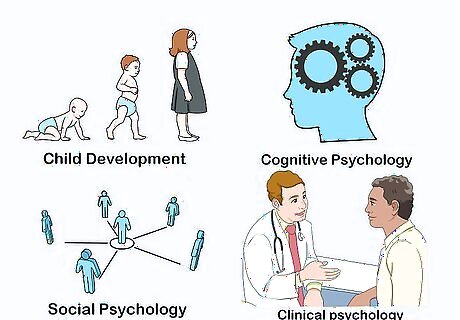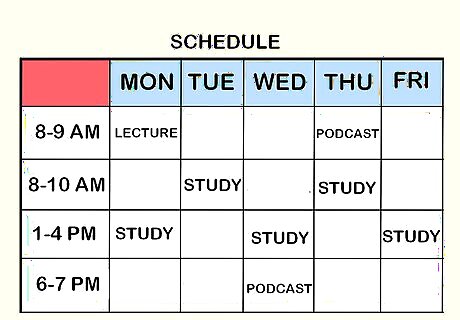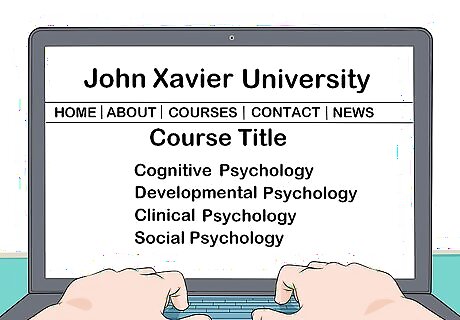
views
Teaching Yourself the Basics of Psychology

Decide what psychological subjects you're interested in. Psychology is the study of the human mind, but there are many different sub-topics within it, like child development, cognitive psychology, social psychology, and clinical psychology. If you want to learn about psychology, you should ask yourself if there's anything specific you'd like to learn. If you do decide there's something specific you'd like to know about, do some preliminary internet research on psychology to see what sub-topics within psychology are most closely related to your interests. Websites of university psychology departments or the website of the American Psychological Association can be reliable places to do some of this preliminary research. For instance, if you decide that you want to know how Psychologists treat patients, you will want to focus on learning about clinical psychology. Or if you decide that you'd like to know about human interaction, you will want to learn about social psychology.

Develop a reading list of popular psychology books. Once you've decided what you want to learn about, you should look for books on your chosen topic. You can search for books on your own on the internet or go to your local library and ask a librarian for assistance. You will want to make sure you select books that are intended for readers looking to learn the basics rather than for advanced readers. You can determine who is the intended audience for a book by paying attention to its title and publisher's description. If a title sounds uninviting or overly specific, it is probably intended for expert readers. For instance, a book titled A Study of Stimulus Response in Males Aged 19-21, would almost certainly be intended for readers already very familiar with psychology. The publisher's description for a book often will tell you about the book's intended audience. For instance, if the back of a book says something like “this book is great for students and curious readers,” it will most likely be intended for readers like you who are not already experts. Some popular psychology books written for a wide audience include: The Social Animal by Eliot Aronson; Thinking Fast and Slow by Daniel Kahneman; The Art of Choosing by Sheena Iyengar; Drive by Daniel H. Pink; and The Power of Habit by Charles Dugigg.

Read psychology textbooks for a more academic overview of the field. While they are sometimes less fun to read, textbooks can give a more authoritative overview of psychology than popular books. Some textbooks that are used in introductory psychology classes at universities include: An Introduction to the History of Psychology by B.R. Hergenhahn and Tracy B. Henley; Introduction to Psychology by James W. Kalat; and Psychology by David G. Meyers.

Learn about contemporary psychological theories by listening to podcasts. If you think you learn better by listening or simply don't have the time to read, you can learn about psychology through podcasts. You can find podcasts on your phone through apps like iTunes (for iPhones) and Podcast Republic (for Androids). There are many podcasts out there, so you should read descriptions of some to find out which discuss topics most closely related to your interests. Anyone can create a podcast, so to ensure that you choose a podcast with accurate information, investigate who makes it. Podcasts produced by psychology experts (people with degrees in psychology) or podcasts produced by well-regarded institutions, like NPR, should be the most reliable. Some popular Psychology podcasts include: “Shrink Rap Radio,” “School of Psych,” and “The Psychology Podcast.”

Learn academic approaches to psychology by listening to lectures. You can also listen to lectures recorded by psychology professors. Lectures are usually more methodical and academic than podcasts. Some universities record a wide variety of lectures and make them available to the public. Yale and Stanford, for instance, have a number of recorded lectures that you can download from their website. Apps like iTunesU aggregate recorded lectures from a number of universities.

Keep a study schedule. Once you have decided what you want to read or listen to, you should make and keep a schedule for studying. Studying at regular times can often help people learn on their own most effectively. Try to schedule studying for times that are actually convenient for you in order to ensure that you stick to your plan. If you are listening to podcasts or lectures, you can decide to combine studying with your commute, with chores, or with exercise. In making a study schedule, try marking specific goals in your calendar. Working towards a deadline can help you stay motivated and on track in your studying.

Take notes on the psychological concepts you learn about. To help retain what you're reading or listening to, take notes on what you learn each day. These notes can be facts that you've learned, questions you have, or your insights into the material. You can take notes with a pen and paper or on an electronic device. By writing notes down, you can usually remember material that you've learned better. Make a note of any terms or concepts you are not familiar with so that you can look them up and do further research.

Find a friend to learn about psychology with. If you find it hard to motivate yourself to study on your own, try to find a friend or family member who is willing to learn about psychology with you. You can agree to read the same books and then discuss them together to compare what you've learned from them. Making learning social often motivates people to stick to a studying schedule. Discussing material with others also often helps people retain information and see a topic in new ways.
Taking Psychology Courses

Choose between online and traditional psychology courses. If you would like to learn about psychology in a more structured way, you can take psychology courses at a college or university. If you are not already a full-time student, you will want to decide whether you want to try to enroll in a course at a nearby school or take a course online. Online courses offer considerably more flexibility, which can be great if you already have a tight schedule. The more rigid structure of traditional courses, though, can help some students stay motivated and learn more effectively. Community colleges often offer courses at a relatively low price and do not require students to study full-time. Many colleges and universities offer online classes, but if you do not need college credit you can take courses online through websites like Coursera. If you are interested in taking a psychology class but do not want to be graded on the material, you can ask the professor if you may audit it—meaning that you sit in on the classes and do the readings but do not have to complete graded assignments. You will not receive college credit for auditing however.

Research course offerings of psychology departments. Once you decide whether you'd like to take an online or traditional course, you should research course offerings to find a class that seems relevant to your interests. You can research course offerings on university websites, which usually provide a brief description of what kind of material courses will cover. Look into programs that match what you might want to do. For instance, if you want to work with families, you might look into a school that offers courses in social work or family therapy.

Take a psychology 101 class to learn the most basic material. If you want to take a class that offers the most general introduction to psychology, try to find a psychology 101 course. Courses with a 101 course number are usually designed for students with no prior education in the topic. If a department does not have a 101 class, you can call or email one of the department administrators to ask which course the department recommends for introductory-level students.

Take more advanced psychology classes to learn about specific topics. If psychology 101 seems too broad for your interests, you can attempt to take a more advanced class that addresses your specific curiosities. Instead of psychology 101, you may try to take a class on social psychology or neuropsychology. However, advanced classes often require specific prerequisite courses, so you will have to check with the professor to make sure you are eligible to take any advanced class that interests you. Occasionally, prerequisite courses can be waived.

Enroll in more psychology classes to expand your knowledge. If you have successfully completed a psychology course and are interested in learning more about the subject, you can enroll in further courses. To find out which courses are best suited for your interests, you can speak with the professor of your course and ask them which classes they’d recommend for you. You can also talk to students who've taken several Psychology classes and ask them if there's any particular course or professor they would recommend.




















Comments
0 comment